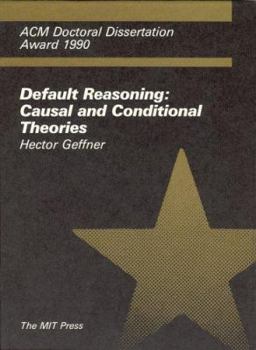Default Reasoning: Causal and Conditional Theories (ACM Doctoral Dissertation Award) (Acm Doctoral Dissertation Awards, 1990)
a powerful default-handling system that yields an intuitive behavior in several domains of interest in AI, including inheritance hierarchies, reasoning about change, general logic programs, and abductive reasoning Defaults in commonsense reasoning permit the generation of useful predictions in the absence of complete information. However, attempts to represent and reason with defaults in Al run into the problem of spurious arguments, arguments that rely on acceptable defaults but which support unacceptable conclusions. Geffner addresses this problem by analyzing the causal and conditional aspects of default, establishing clear theoretical limits on the capabilities of probabilistic approaches. He provides new insights into the nature of defaults, and new methods of processing databases containing default expressions. The result is a powerful default-handling system that yields an intuitive behavior in several domains of interest in AI, including inheritance hierarchies, reasoning about change, general logic programs, and abductive reasoning. Geffner develops an axiomatic system based on a probabilistic and a model-theoretic semantics in which defaults are regarded as assertions whose truth or likelihood is bound to a particular context. He contrasts these conditional interpretations with standard extensional interpretations, and notes that while the former properly resolve arguments of different "specificity," the latter properly account for arguments involving "independence" assumptions. Geffner then combines the best features of both interpretations into a more powerful account of default reasoning which he calls conditional entailment. Conditional entailment is based on an ordering of defaults extracted from the knowledge base and can be computed by an elegant argument system, in which arguments of different strength interact, and strongest arguments "win." This system can be extended with a causal operator and suitable coherence considerations to provide an adequate solution to many problems involving causation and abduction. Contents Introduction - A System of Defeasible Inference Based on Probabilities - High Probabilities and Preferential Structures - Irrelevance and Prioritized Preferential Structures - The Causal Dimension: Evidence vs - Explanation - Conclusions - Proofs
Format:Hardcover
Language:English
ISBN:0262071371
ISBN13:9780262071376
Release Date:March 1992
Publisher:Mit Pr
Length:234 Pages
Weight:1.26 lbs.
Dimensions:9.3" x 0.8" x 7.0"
Age Range:18 years and up
Grade Range:Postsecondary and higher
Customer Reviews
customer rating | review
There are currently no reviews. Be the first to review this work.












